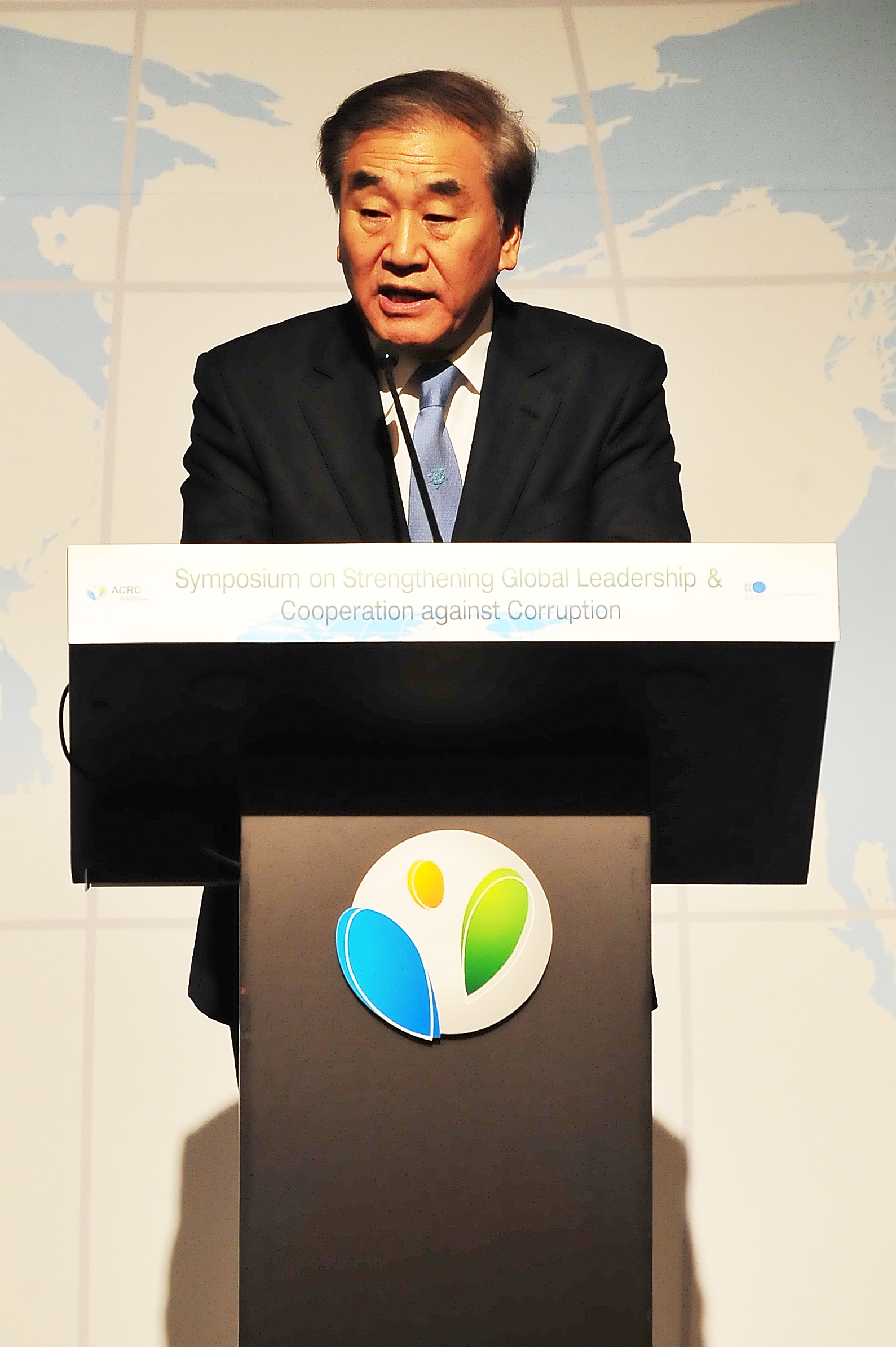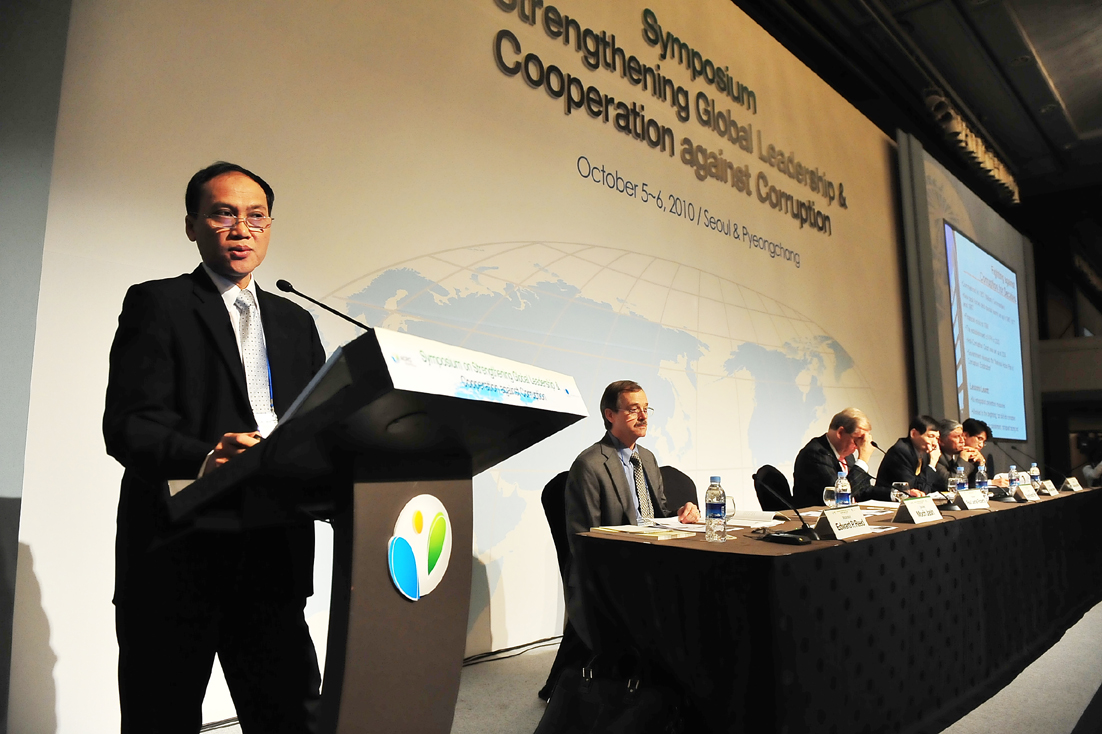At a symposium in Seoul, international experts voiced the need to strengthen the roles of G20 countries in the global fight against corruption.
The Symposium on Strengthening Global Leadership and Cooperation against Corruption, organized by the Anti-Corruption and Civil Rights Commission (ACRC) in cooperation with OECD/Korea Policy Centre on October 5-6, brought together more than 250 representatives from 25 countries, including G20, OECD, and APEC member economies.

Minister Jae Oh Lee is making a keynote speech at the global anti-corruption symposium held in Seoul on 5 October.
| During the meeting, high-level officials around the world and international experts discussed the formulation and progress of international anti-corruption regimes, best practices of anti-corruption policies and efforts in major countries, and roles of leading countries for increased transparency in the international community.
Jae Oh Lee, Minister for Special Affairs and former ACRC Chairman, said in his keynote speech that leading-by-example and voluntary support by advanced countries will facilitate the creation of a fair and just global community.
"A fair and transparent world can be realized when major countries including the G20 work together and help each other to lay down and abide by the rule of the game based on justice."
In the session titled "formulation and development of international anti-corruption rounds," Giovanni Gallo, Corruption Crime Expert of the UN Office of Drugs and Crime, explained the progress on the adoption and enforcement of the United Nations Convention against Corruption (UNCAC). He stressed that a robust anti-corruption regime such as the UNCAC can contribute to sustainable development and recovery from the global financial crisis. |
Speaking on the transnational anti-corruption regime sponsored by the OECD and the UN, New York University Professor Kevin Davis pointed out potential disadvantages including incompatibility with local needs and "institutional displacement," as well as its positive role in combating political corruption.
Adrian Fozzard, Director of Stolen Assets Recovery (StAR) Initiative, said that the G20 Anti-Corruption Action Plan drafted last month in Jakarta presents a very practical tool to prosecute corrupt officials and recover the proceeds of corruption. He also underscored the importance of exchanging information and best practices with other countries.
"As prevention is the best cure, Korea's Integrity Survey is an interesting policy that the international community can learn, and a useful stool for other countries," he added.

Moch. Jasin, Vice Chairman of Indonesia’s Corruption Eradication Commission, is speaking on the achievements and challenges in Indonesia’s combat against corruption.
| According to Moch. Jasin, Vice Chairman of Indonesia's Corruption Eradication Commission, the key success factors of the Indonesian anti-corruption body include its comprehensive power to investigate and prosecute corruption cases and strong support both from Indonesian civil society and from the international community. However, weakening political will and bureaucracy were considered major challenges to its fight against corruption.
Paul Lachal Roberts from the European Anti-Fraud Office presented the EU's recent anti-corruption initiatives including the "Fraud Notification System," which enables any person to report corruption anonymously via the Internet. He expected that with the adoption of Lisbon Treaty in 2009, new measures including the creation of a European Public Prosecutor will be introduced to facilitate cross-border criminal and judicial cooperation. |
Sung-kwon Park, Director General of Anti-Corruption Bureau of the ACRC, gave an overview of Korea's major anti-corruption measures including the Integrity Survey, Anti-Corruption Initiatives Assessment, and Corruption Impact Assessment.
"By sharing these corruption prevention tools, the ACRC is willing to contribute to building anti-corruption capacities of other countries," said Park.
Dato' Sri Abu Kassim Mohamed, Chief Commissioner of Malaysian Anti-Corruption Commission, said that a trustworthy and independent anti-corruption agency, a holistic approach to the fight against corruption, and raising of public awareness on the risks of corruption are the three most crucial elements in developing anti-corruption policies and strategies.
François Badie, Commissioner of France's Central Department for the Prevention of Corruption (SCPC), presented the SCPC's functions, including analysis of information on corruption, raising of awareness and training, and bilateral and multilateral activities. He said that France is available to provide expertise and assistance to requesting states with a view to enhancing the effectiveness of anti-corruption systems.
Charles Caruso, Anti-Corruption Advisor in the Asia-Pacific Region of the US State Department, urged that the primary role of leading countries in the field of global anti-corruption efforts should be focused on identifying and tackling corrupt activities causing widespread and systematic damage.
Patrick Moulette, Head of Anti-Corruption Division of the OECD, presented the recent developments in the OECD anti-bribery framework, including the 2009 recommendation on combating foreign bribery and "Good Practice Guide on Internal Controls, Ethics and Compliance." He said that the 38 Parties to the OECD anti-bribery convention are exploring ways to support the G20 anti-corruption agenda.
The ACRC officials said that ahead of the G20 Seoul Summit in November, the symposium suggested a way forward for the leadership and collaboration of the countries that are taking the lead in the fight against corruption, and provided an opportunity to explore the strategies to ensure effective implementation of anti-corruption policy.











